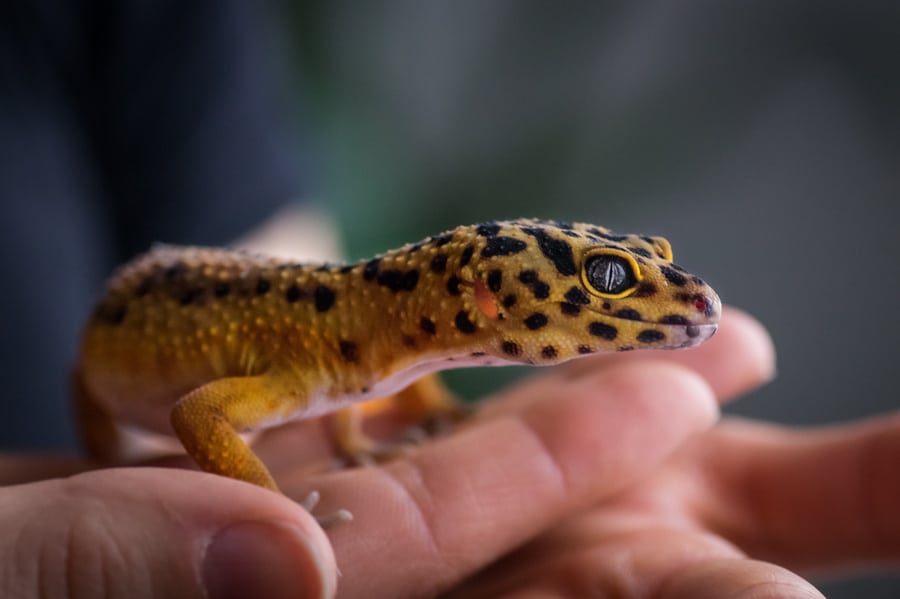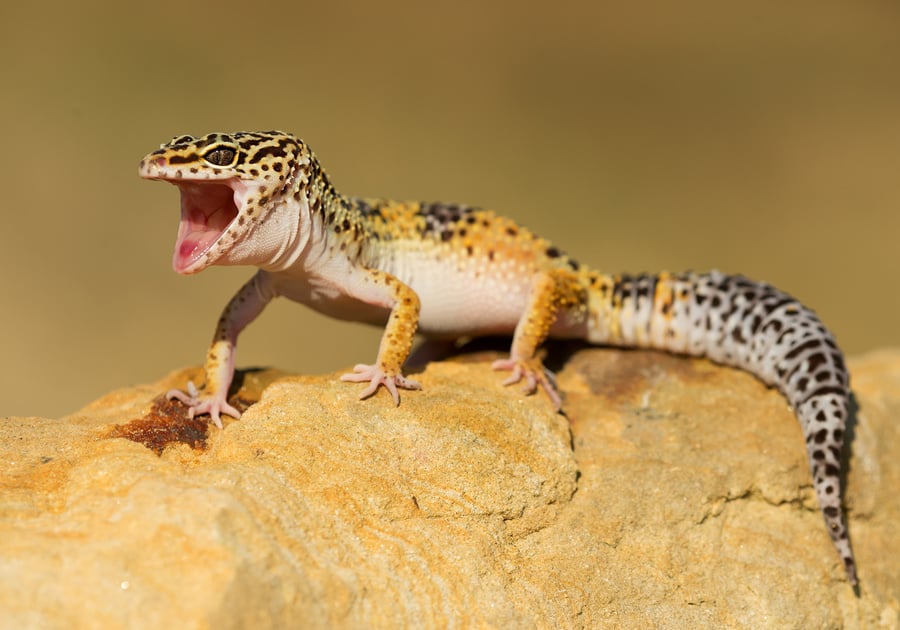
Any unfamiliar noise can be startling to the new or experienced leopard gecko owner. Especially if you are used to having a rather quiet gecko, hearing a hiss may seem alarming. So, why do leopard geckos hiss?
Leopard geckos may hiss if they feel nervous or threatened and are most likely to hiss at someone they do not recognize. These behaviors are easy to remedy as leopard geckos will be much more friendly once they trust you.
Before we get into the reasons behind hissing behavior, it’s important to note that leopard geckos are not naturally aggressive lizards. However, like any animal, leopard geckos may hiss if they feel threatened or stressed. So, if your leopard gecko is hissing at you, there is likely a reason why.
As the leopard gecko’s owner, it’s up to you to figure out why that leopard gecko is hissing at you and remove that stressor as soon as possible.
Leopard Geckos & Hissing
Do Leopard Geckos Hiss?
While it may depend on the age of your leopard gecko or how familiar it is to its environment, leopard geckos can hiss. Typically, hissing means that the leopard gecko feels threatened or nervous. For example, you may notice that a leopard gecko hisses if you have just put it in a new environment, have just adopted it, or if there have been significant changes to its environment.
Additionally, it is more likely that a leopard gecko will hiss if it is not familiar with you. Even if you have just adopted a baby gecko, there is a good chance that it will hiss at you if you have not taken the proper precautions in socializing it. For more information on how to reduce hissing and other signs of defensive behavior, read on.
Signs of Aggression in Leopard Geckos
If your leopard gecko is showing signs of aggression, it likely means that there is something in its environment that is making it feel uncomfortable. Leopard geckos are not naturally aggressive creatures. So, it is more likely that something is agitating your gecko and you should take the time to figure out what is impacting your gecko’s behavior.
Sometimes, it can be difficult to decide if your leopard gecko is being aggressive or acting normally. Especially if you are a new gecko owner, you may not always recognize symptoms of aggression or defensiveness in your leopard gecko.
While some symptoms, such as charging or hissing, are clear indicators that your leopard gecko is being defensive, some tail patterns do indicate aggression or defensiveness in leopard geckos.
Additionally, one common move that is often seen by defensive leopard geckos is when they crouch low to the ground and put their tail in the air. Once its tail is in the air, you will notice that the tail makes an “S” pattern. If you notice that your leopard gecko is doing this stance, give it some space and leave it alone for the time being.
For example, some typical signs of defensive behavior in leopard geckos could be:
- Hiding instead of coming out to say hi.
- Various vocalizations (discussed below).
- Charging at you with an open mouth.
- Crouching down with their tail in a vertical position.
- Tail dropping low.
Remember, leopard geckos are naturally solitary creatures. So if you notice that your leopard gecko is agitated, acting defensive, or seems anxious, give it some space. After leaving your leopard gecko alone for a few hours or so, you can try again and see if it is acting defensive. Just make sure you are cautious and don’t move too quickly as you search the enclosure for any potential stressors.
What Does Leopard Gecko Hissing Tell You?
As mentioned above, a hissing leopard gecko is telling you that it is uncomfortable, stressed, or feels threatened by you. Mostly, you will notice hissing in baby leopard geckos. Or, you may also notice hissing behavior if you have adopted a new adult leopard gecko that is not used to you. Hissing may be especially prominent if that adult leopard gecko was not properly socialized.
However, there may be other reasons why your leopard gecko is hissing at you. Below we will discuss the most common reasons why you may notice hissing in a leopard gecko.
You Snuck Up on Your Gecko
Even though your leopard gecko may be familiar with handling and you have done your best to socialize it, there is still always a chance that you are going to spook your leopard gecko. Especially if you go in the tank from above, startling your leopard gecko is one good way to get hissed at.
Because your leopard gecko has natural instincts, anytime they are startled there is a chance that they will become defensive or hiss at you. To avoid startling your leopard gecko, make sure it sees you as you approach it. Particularly before you reach in to grab your leopard gecko, make sure your gecko knows that you’re there and that it can see your hand coming towards it.
For example, never reach above your leopard gecko or from behind. That is one surefire way to startle it and make it feel threatened or anxious. Further, it may be best to purchase a gecko enclosure that opens from the front instead of the top. That way, your leopard gecko can always see you coming.
You’re Mishandling Your Gecko
Leopard geckos do not like to be handled roughly. So, if you are mishandling them or even holding them in a way that they don’t like, there is a good chance that they will show signs of defensiveness. Additionally, if you constantly mishandle your leopard gecko, it will not learn to trust you and it will be harder to clean your gecko’s enclosure, clean your gecko, and handle it in general.
While trust may not sound like the most important thing when it comes to raising a leopard gecko, it is probably one of the most crucial aspects of being the owner.
Even though leopard geckos don’t necessarily feel motions, it is important that they are comfortable around you and that they learn to enjoy being handled. That being said, make sure you closely watch your gecko’s behavior to see if it feels uncomfortable or threatened.
Unfamiliar Environment
Even humans can feel anxious in an environment that they’re not familiar with. That being said, putting your leopard gecko into a new enclosure or putting a new leopard gecko into your enclosure can be nerve-wracking. So, when you do adopt a new leopard gecko or upgrade its enclosure, you can expect it to feel uncomfortable and potentially show signs of aggression as it adjusts to a new environment.
If you notice that the new environment is causing your leopard gecko stress, the best thing you can do is to let it be alone and explore its new enclosure. Don’t worry, as long as all the vivarium settings are within the appropriate ranges, your leopard gecko will become used to its environment and eventually calm down.
Changes to Existing Environment
The environment does not necessarily have to be new for it to cause stress for leopard gecko. How would you feel if someone came into your house and started moving around all your furniture without you knowing? Exactly, just like anyone else, a leopard gecko may feel stressed if you make any changes to its environment.
Besides changes to the environment, your leopard gecko may feel agitated during shedding or even pregnancy. However, hissing during this time does not mean that your leopard gecko suddenly doesn’t like you anymore.
Instead, it probably means that it is uncomfortable and needs to take time to be by itself as it adjusts to its new settings. You can also rest easy knowing that your leopard gecko will adjust and it will be back to its normal self in no time.

How to Calm Your Leopard Down
Quite honestly, the best way to calm your leopard gecko down is to give it some space. If you notice hissing or any defensive behaviors, leave your leopard gecko alone for a couple of hours or even for the rest of the day.
Once you check on your leopard gecko and you notice that your gecko is less agitated, make sure you check your enclosure settings to make sure that they are at the optimum temperature and humidity.
Additionally, some leopard geckos can get territorial if they see another lizard or leopard gecko in a nearby enclosure. If your gecko can see another gecko, move its enclosures or create a barrier so that the two of them cannot see each other.
Do Leopard Geckos Make Sound?
Hissing sounds are not the only sounds you’ll hear from your leopard gecko. As a responsible leopard gecko owner, you will learn to understand each sound that your gecko makes so that you can properly respond and know when to make changes to your gecko’s environment.
Chirping and Squeaking
Chirping and squeaking noises typically indicate that a leopard gecko is not happy about something. While it may not indicate outwardly aggressive behavior, it still means that you should stop doing whatever is upsetting your leopard gecko.
Further, leopard geckos have also been known to chirp or squeak when they’re hungry or even as they explore their surrounding environment. In these instances, chirping and squeaking are perfectly normal behaviors.
Clicking
Clicking is a common sound that is typically heard when a leopard gecko is threatened or stressed. For the most part, leopard gecko owners may hear clicking sounds if their leopard gecko is being mishandled.
Additionally, you may also hear a clicking sound if you are trying to introduce your leopard gecko to a neighboring leopard gecko or another lizard. This also means that the leopard gecko feels stressed and uncomfortable.
Screaming & Screeching
When your leopard gecko screams or screeches, the sound can be loud and startling. While you may think that your leopard gecko is in pain, screaming and screaming means that you’re going into defensive mode. Additionally, this means that your leopard gecko feels incredibly threatened and stressed.
Barking
When a leopard gecko barks it sounds a lot like chirping except that the bark sounds a little more like your leopard gecko has something caught in its throat. This sound typically means that your leopard gecko feels threatened in some way and that you should work to remove the stressor and leave it alone for the time being.
Leopard Geckos Hissing at Other Animals
You may notice that your leopard gecko will hiss at other animals and lizards. Because hissing indicates that your leopard gecko feels threatened, is perfectly normal to hear your leopard gecko hiss at your cat, dog, or any other animal that has access to its enclosure.
Additionally, if your leopard gecko can see another lizard enclosure, there’s a good chance that leopard gecko will hiss. Leopard geckos are typically solitary animals and do not like the presence of other geckos. So even if your leopard gecko can see another lizard from across the room, you may notice territorial and defensive behavior.
Do Other Pet Lizards Hissing Mean the Same Thing?
Typically, hissing means the same thing across other pet lizards. When you hear your leopard gecko, bearded dragon, or other pet lizard hiss, it usually means that they are feeling threatened, stressed, or agitated. Most commonly, hissing is an aggressive or defensive behavior that means the lizard wants you to give it some space.
How to Reduce Aggression and Stress in Leopard Geckos
Luckily, there are some ways that you can reduce aggression and stress in your leopard gecko. While the most important aspect to reducing any stress in your leopard gecko is making sure that the environment that they’re in is appropriate, socialization also plays a key role in reducing defensive behaviors.
Socialization
Among the most important things that you can do to help reduce aggression and stress in your leopard gecko is making sure it is properly socialized. This means you should spend anywhere from 15 to 20 minutes each day socializing your leopard gecko. After your leopard gecko learns to trust you, you can extend this time.
To socialize your leopard gecko, daily handling is key. The best time to socialize your leopard gecko is when you are cleaning its tank or when you are feeding it.
During this time, you can gently stroke your leopard gecko from head to tail or give it treats so that it gets to know you. Once your leopard gecko feels more comfortable with you, you can start by picking it up and holding it so that it gets used to human touch.
Check Vivarium Settings
Another common reason why your leopard gecko may feel stressed or agitated is that its vivarium is not at the correct settings. If you do not already have a thermometer and humidity tracker in your vivarium, you need to get one. If there are any variations within the tank settings, there’s a good chance that your leopard gecko will start to feel ill or stressed.
Remove Other Pet Lizards
If your leopard gecko can see any other pet lizards, there’s a good chance that it will feel stressed and hiss. So, it’s important to make sure that you have a barrier set up between vivariums so that the lizards cannot see each other. Additionally, you should make sure you place your enclosures in a way that no other lizards can see each other.
Give it Some Space
If you notice that your leopard gecko is stressed or agitated, the best thing you can do is to give it some space. Particularly affair hissing, screeching, or barking, you want to make sure that you back off and give your leopard gecko some time to be alone.
Especially if they are shedding or being territorial due to a particularly interesting female, give your leopard gecko some time to cool off before you handle it.
Add Some Furniture
One of the main reasons that the leopard geckos can get stressed is if they don’t have enough places to hide in their enclosure. So, make sure you have enough vivarium furniture in the enclosure so that your leopard gecko has multiple places to choose from for hiding spots.
Check for Illness
If you have exhausted all other reasons why your leopard gecko could be feeling defensive or stressed, you may want to check it for any signs of illness or injury. While this can be difficult if your leopard gecko is showing signs of aggression, it’s best to monitor it to see if you notice any health issues.
For example, you want to look to see if your leopard gecko is eating, drinking, defecating, and urinating normally. If you are worried about the health of your leopard gecko, make sure you call your veterinarian set up a time to bring it in.
